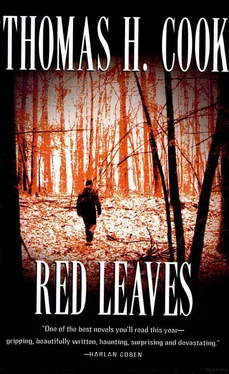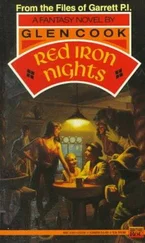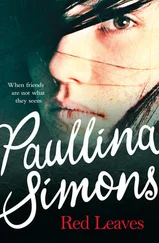"Jesus, Eric," Meredith gasped. "You said that to him?"
"No," I answered. "But he saw it."
She stared at me as if I were a strange creature who'd just washed up on the beach beside her, a crawler of black depths. "You had no evidence of that at all, Eric," she said. "No evidence at all that Warren did anything to your sister"—there was a lacerating disappointment in her gaze—"How could you have done that? Said something like that without ... knowing anything?"
I thought of the way she and Rodenberry had stood together in the parking lot, their bodies so close, the cool air, the night, the rustle of fallen leaves when the wind touched them. "You don't always need evidence," I said coldly. "Sometimes you just know."
She said nothing more, but I felt utterly berated, like a small boy whipped into a corner. To get out of it, I struck back in the only way that seemed open to me.
"I saw you tonight," I told her.
"Saw me?"
"You and Rodenberry."
She seemed hardly able to comprehend what I was saying.
"In the parking lot at the college."
Her lips sealed tightly.
"Talking."
Her eyes became small, reptilian slits. "And?" she snapped. "What are you getting at, Eric?"
"I want to know what's going on," I said haughtily, a man who knew his rights and intended to exercise them.
Fire leaped in her eyes. "Wasn't Warren enough for you, Eric?" she asked. "Isn't one life enough?"
She could not have more deeply wounded me if she'd fired a bullet into my head, but what she said next was said with such utter finality that I knew nothing could return me to the world that had existed before she said it.
"I don't know you anymore," she added. Then she turned and walked up the stairs.
I knew that she meant it, and that she meant it absolutely. Meredith was not a woman to make false gestures, bluff, halt at the precipice, or seek to regain it once she'd gone over. Something had broken, the bridge that connected us, and even at that early moment, when I was still feeling the heat of her eyes like the sting of a slap, I knew that the process of repair would be long, if it could be done at all.
TWENTY-FIVE
Warren was buried on a bright, crisp afternoon. My father had told me flatly that he had no intention of going to the funeral, so it was only the strained and separating members of my second family, along with a few people Warren had gotten to know over the years, regulars at the bars he frequented, who came to say good-bye to him.
Meredith watched stiffly as the coffin was lowered into the ground, Keith at her side, looking even more pale and emaciated than usual. He'd reacted to Warren's death by not reacting to it at all, which was typical of Keith. Standing at the grave, so small a force beside the tidal wave of his mother, he looked incapable of weathering any of life's coming storms. I could not imagine him ever marrying or having children or adequately managing even the least complicated and demanding aspects of life.
When the funeral was over, we walked out of the cemetery together, Merediths body so rigid, her face so stonily composed, holding down such sulfuric rage, that I thought she might suddenly wheel around and slap me.
But she didn't, and so, as we all passed through the gate of the cemetery, I suppose we looked like a normal family, one whose members shared grief and joy, made the best of whatever life sent our way.
At least that is certainly how we appeared to Vincent Giordano.
He was standing outside his delivery van, its door oddly open, as if in preparation for a quick getaway. His eyes were no longer moist and bloodshot, not at all like the day he'd approached me outside the photo shop. He stood erect, rather than stooped, and there was nothing broken or beggarly in his posture. He pulled away from the van as we approached our car, his body rolling like a great stone toward us.
I looked at Meredith. "Get in the car," I told her, then turned to Keith. "You, too."
By then Vince was closing in.
"Hello, Vince," I said coolly.
Vince stopped and folded his large beefy arms over his chest. "I just came to tell you it won't work."
"I don't know what you mean."
"That brother of yours shooting himself," Vince said. "It's not going to get that son of yours off the hook."
"Vince, we shouldn't be having this conversation."
"You heard what I said."
"Its in the hands of the police, Vince. And that's where it should be."
"You heard what I said," Vince repeated. "That kid of yours is not going to get away with it. You can hire a fancy lawyer, do whatever else you want to, but that kid is not going to get away with it." His eyes flared. "My little girl is dead."
"We don't know that."
"Yes, we do," Vince said. "Two weeks. What else could it be?"
"I don't know," I said.
He looked over my shoulder and I knew he was glaring at Keith.
"They found his cigarettes at Amy's window," Vince said. "Outside her window. He said he didn't leave the house. So, whose cigarettes are they, huh? Tell me that. Why did he lie, tell me that!" His voice rang high and desperate, reaching for heaven. "Tell me that. You or that fancy lawyer you hired to protect his fucking ass!"
"That's enough," I said.
"It's your whole goddamn family that's screwed up," Vince screamed. "A brother watches kids in the playground, looks at dirty pictures of little kids. That's where that son of yours got it from. The family. In their blood." He was seething now. "You should all be wiped out!" he cried. "Every goddamn one of you!"
I felt his hot breath on my face, turned quickly, strode to my car, and got in. For a moment we locked eyes, and I saw how deeply Vince Giordano hated me, hated Keith, hated the neat little family he'd watched come through the cemetery gate, the kind of family he'd once had and which had been taken from him, he felt certain, by my son.
We drove directly home, Meredith trembling all the way, terrified that Vince would follow us there. From time to time, she glanced at the rearview mirror, searching for his green van behind us. I had never seen her so frightened, and I knew that part of her fear was that the husband she'd once trusted had changed irrevocably.
At home, she wanted me to call the police, but I had leaped to so many conclusions of late, that I refused to leap to another one.
"He's just upset," I told her. "He has a right to be."
"But he doesn't have a right to threaten us," Meredith cried.
"He didn't threaten us," I reminded her. "Besides, the police won't do anything. They can't unless he does something first."
She shook her head in exasperation, no doubt convinced that here again I was simply refusing to confront the obvious truth that Vince Giordano was a dangerous man. "All right, fine," she snapped, "but if anything happens, Eric, it's on your head."
With that, she stormed down the corridor to her office and slammed the door.
I built a fire and for a long time sat, staring at the flames. Outside, autumn leaves gathered and blew apart at the will of the wind. The gray air darkened steadily, and night finally fell. Yet Meredith remained in her room, and Keith in his.
It wasn't until early evening that one of them, Keith, finally joined me in the living room.
"So, are we not going to have dinner?" he asked.
I drew my eyes from the fire and faced him. "Nobody feels like cooking, I guess."
"So, what does that mean ... like ... we don't eat?"
"No, we'll eat."
"Okay."
"All right," I said. I got to my feet. "Come on, let's go get a pizza."
We walked out of the house and down the brick walkway, past the shadowy limbs of the Japanese maple.
The drive to Nico's took only a few minutes, and on the way, Keith sat on the passenger side, looking less sullen than before, as if he were beginning to emerge from the tiresome irritation of his teenage years. A light played in his eyes, a hint of energy, or perhaps some spark of hope that his life might one day be less plagued with trouble. I recalled a line I'd read somewhere, that we must be able to imagine redemption before we can achieve it.
Читать дальше












